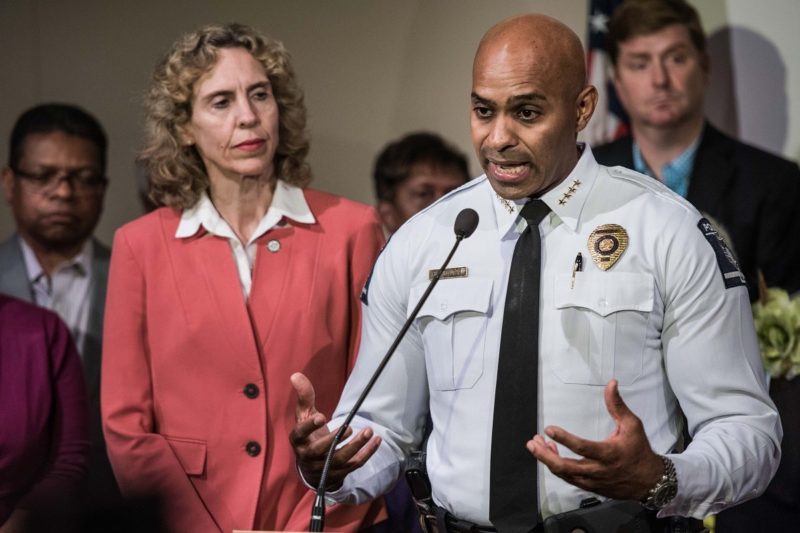Are North Carolina Officials Stalling to Release Videos of Keith Lamont Scott Shooting Because of HB 972?
At a news conference Friday morning, Mayor Roberts said that she believes the video of Scott’s shooting should be released publicly, but that it’s a matter of when. “The question is timing,” she said. Charlotte-Mecklenburg Police Chief Kerr Putney agreed, refusing to release the recordings to the public. The real question is why.

Protesters in Charlotte are demanding transparency in the shooting death of 43-year-old Keith Lamont Scott on Tuesday. Rev. William Barber, head of the North Carolina chapter of the NAACP and leader of Moral Mondays, said the videos of the shooting—one from a dashboard camera and another from a body camera—should be released. Even Keith Lamont Scott’s family, after watching the videos yesterday, said the footage should be released.
Releasing the videos could very well put an end to the ongoing protests in Charlotte, but Charlotte Mayor Jennifer Roberts (D) and North Carolina law enforcement seem to be stalling.
At a news conference Friday morning, Mayor Roberts said that she believes the video of Scott’s shooting should be released publicly, but that it’s a matter of when. “The question is timing,” she said. Charlotte-Mecklenburg Police Chief Kerr Putney agreed, refusing to release the recordings to the public.
The real question is why.
If I were to deploy “125th Street logic,” I’d grab a sandwich board and head to a street corner in an ungentrified section of Harlem to rant about how the WHITE MAN doesn’t want you to even SEE the videos, my brotha!
But maybe it’s not tinfoil hat logic: Maybe a white man really doesn’t want you to see the videos.
In July, Gov. Pat McCrory signed legislation, HB 972, which effectively bans the release of body and dashboard camera footage to the public, with some limited exceptions. That law goes into effect on October 1, just a little more than two weeks from now.
The law declares that footage is not a public record under North Carolina’s public record statutes, which means they are not subject to public records requests by, for example, the media.
There are some exceptions—for example, if a person appears in the recording, or a person’s minor child is in the footage—but none make it any easier for the public to get the camera footage without a court order.
So when Mayor Roberts says “the question is timing,” one wonders if officials in Charlotte are simply waiting out the clock until October 1, when the chances of the public ever viewing the footage becomes subject entirely to the whims of law enforcement.
The public has a right to view the footage; after all, the police work for the public. And it seems to me that the cops should want to release the footage if they expect the protests in Charlotte to end any time soon.
But what if the footage conflicts with what the police have been claiming thus far?
Stories have been conflicted about what happened. The cops, of course, went with the story we’ve all grown accustomed to hearing when a Black man is shot down in the street.
He had a gun. He posed a threat. He had to be shot dead.
But North Carolina is an open carry state. And in North Carolina concealed carry is legal, as long as you have a permit.
And here’s the kicker: In 2013, the Fourth Circuit Court of Appeals ruled in a case called United States v. Black, that just because a person is carrying a handgun, that doesn’t give police sufficient cause to stop and frisk that person.
So even if Scott had a gun, why was he stopped in the first place?
And besides, Scott’s family disputes that he had a gun. His family insists that he had a disability, was sitting in his car reading a book, and didn’t have a gun.
Scott’s sister said to reporters that he liked to sit in the shade, read a book, and wait for his kid to get off the bus.
And in a video, taken by Scott’s daughter, Lyric, she can be heard yelling at police not to plant a weapon in her father’s car. “Because that’s what the fuck y’all do,” she said.
It’s hard to argue with her logic. After all, it certainly appears to be what the fuck Michael Slager did when he killed Walter Scott in South Carolina in April of last year.
Putney said in a statement Wednesday that it was unclear whether Keith Lamont Scott pointed the alleged weapon at police. And on Thursday, after viewing the videos, Putney said, “The video does not give me absolute, definitive visual evidence that would confirm that a person is pointing a gun,” according to the New York Times.
Putney went on to say that the video “supports what we’ve heard and the version of the truth that we gave about the circumstances that happened that led to the death of Mr. Scott.”
Version of the truth, eh?
Where I come from there’s either the truth, and not the truth.
The cops must be transparent. That means they should release the video footage immediately, and not wait until “the right time,” especially if the right time is after HB 972 goes into effect on October 1, thus permitting them to withhold the footage from the public.
Given that the circumstances of Scott’s death are suspicious at best, and given that the protests in Charlotte will likely continue until the public gets some answers—if Ferguson and Baltimore showed us anything, it’s that protesters aren’t going to just “let it go”—the cops need to release the videos posthaste.
